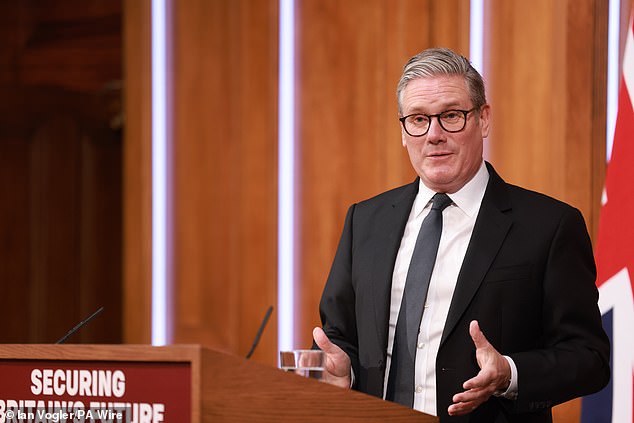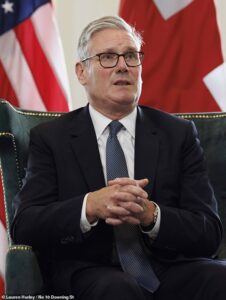By CAMERON ROY
Published: | Updated:
Up to one in 20 residents in parts of England and Wales are immigrants who moved here last year, new analysis suggests.
It comes after Government statistics last week revealed that the total population of the two nations shot up by 700,000 in 2023/24. Immigration fuelled the surge – the second largest since WW2.
The Daily Mail can reveal that net international migration – defined as the difference between the number of people entering the country and leaving – was positive in all but one of 318 councils.
Newham, home to roughly 374,000 people, saw an influx of 17,200 immigrants in the year to mid-2024.
That suggests new migrants arriving from abroad in the last year now account for 4.6 per cent of the London borough’s total population – roughly one in 20 people.
Luton (4.3 per cent) and Coventry (4.2 per cent) had similarly high figures, according to estimates published by the Office for National Statistics (ONS).
Experts say current immigration levels, which have hit all-time highs, are piling even greater pressure upon on housing, schools and the NHS.
Our postcode search tool – available to use below – shows how the situation in your area has changed over the last 12 months, tracking births and deaths as well as net international migration.
Robert Bates, research director at the Centre for Migration Control, said mass migration is ‘changing the very fabric of Britain’.
He said: ‘Assimilation has been made impossible by the sheer scale of mass migration and our national culture is damaged as a result.
‘Stretched public services – from the NHS and GP surgeries to public transport and schools – are being further eroded by a low wage, low-skill immigration system.
‘Politicians have ignored the concerns of voters due to a misguided belief that open borders benefit the economy.
‘We fast need a government which rejects this dogma and starts work to scrap a whole raft of failed visa routes, end foreign nationals’ access to the welfare system, and invests in skills for the British workforce.’
There were an estimated 61.8m people in England and Wales in mid-2024, up from 61.1m in mid-2023, according to the ONS’ estimates.
That increase, of 706,881 people, was eclipsed only by the 821,210 population rise in the 12 months to mid-2023, with growth in both years driven almost wholly by record rises in the number of migrants.
Some 1.1m people are thought to have immigrated in the last 12 months, countered by the 450,000 believed to have emigrated.
Reform UK leader Nigel Farage yesterday claimed the figures were’ disastrous for the quality of life for everyone in the country’.
There were slightly more births (596,012) than deaths (566,030) in the year to mid-2024, which added just 29,982 to the population.
In terms of raw numbers, the biggest local authorities, such as Birmingham (38,700) had the most international migrants arriving.
Given the West Midlands city has a population of 1.2million, however, the effects of international migration aren’t as stark as they are in Newham.
The City of London technically had the highest share of its current population down to international migration in 2024 (10.8 per cent) – although it is home to only 15,000 people.
Only one local authority, South Holland in Lincolnshire, experienced a negative sum, due to more international migrants leaving than arriving.
The ONS said it had 557 arrivals from abroad last year, but 695 people emigrated.
Movement around the UK – known as internal migration – is recorded separately.
Alp Mehmet, chairman of Migration Watch UK, said: ‘The latest ONS figures are another eye-opener.
‘While there is no breakdown of migration into nationality, sex, age or immigration status – as the ONS should do in the future – overall, the population of England and Wales increased by over 700,000 (the equivalent of Newcastle.)
‘Just 30,000 of this was from births exceeding deaths.’
Mr Mehmet also branded the government’s response to the rising rates as ‘complacent’.
He said: ‘Most worrying, these latest figures show that the speed with which the nature of our society is changing has not let up, and that the ethnic minority proportion of our population will become the majority in 30-35 years.
‘The government must take decisive action to stem the immigration tsunami if we are not to become the island of strangers the Prime Minister referred to a few months ago.’
The ONS cautions there might be some overlap in the data, although it is unclear by how much because of the difficulties in examining population flow.
For example, the same person could be classed as both an international immigrant and internal emigrant. They could also die, further confusing the picture.
Tory shadow Home Office minister Katie Lam said the data showed the population is rising at ‘an unsustainable pace’.

She said: ‘This isn’t about numbers on a spreadsheet, it’s about pressure on housing, NHS waiting lists, school places, wages and it’s about community and our culture.
‘Britain simply cannot plan or build fast enough to keep up.
‘We must secure our borders and deliver a fair and sustainable immigration system that works for the British people.’
However Home Secretary Yvette Cooper said yesterday the figures ‘confirm the truth of the Tory legacy on immigration’.
She added: ‘Their failed open borders experiment resulted in net migration quadrupling to a peak of almost a million per year in 2023 even as they promised it would fall.
‘Since the election, net migration has come steeply down, and as part of the Government’s Plan for Change we have set out new measures in the Immigration White Paper and have already changed immigration rules to bring net migration down further.
‘To be successful, effective and fair, our immigration system must be properly controlled and managed. Out of the chaos and failure of the Tory past, that is what this Government will deliver.’
Keir Starmer unveiled a crackdown on immigration in May, warning that failure to control the system risked turning Britain into an ‘island of strangers’.
Downing Street was forced to deny angry comparisons from MPs that it was an echo of Enoch Powell’s infamous ‘Rivers of Blood’ speech.
Scrambling to blunt the threat of Reform, Sir Keir has vowed to give voters what they had ‘asked for time and time again’ as he announced a package to ‘take back control of our borders’.
However, the month after the speech Sir Keir went on to say he ‘deeply regretted’ it, despite polling showing most Brits had no problem with the language used.
His package of long-awaited policies to curb immigration involved a hiking of the skills threshold for immigrants and a toughening of the rules on fluency in English.
Migrants will also be required to wait 10 years for citizenship rather than the current five and face deportation for even lower-level crimes.
Policymakers estimate the Government’s package will bring down annual inflows by around 100,000.
It comes after Sir Keir signed a deal with French president Emmanuel Macron in a desperate attempt to solve the small boat Channel crisis.
The Prime Minister and his French equivalent announced a ‘one in, one out’ migrant swap deal, although it was far less ambitious than expected.








